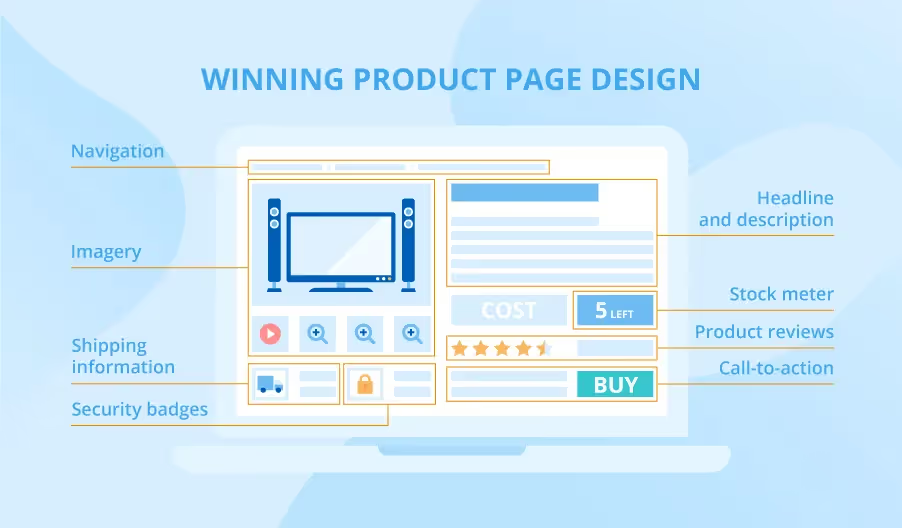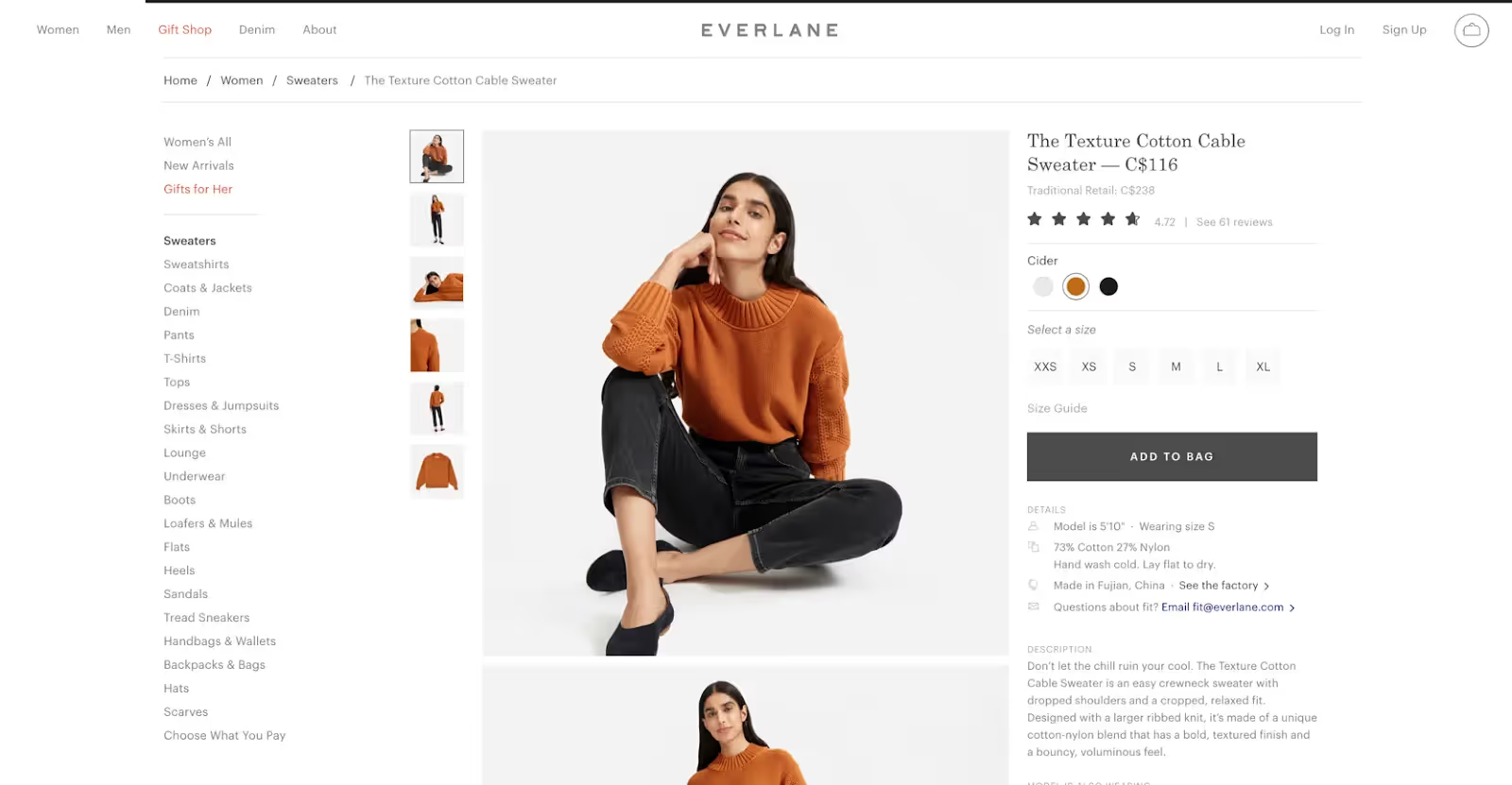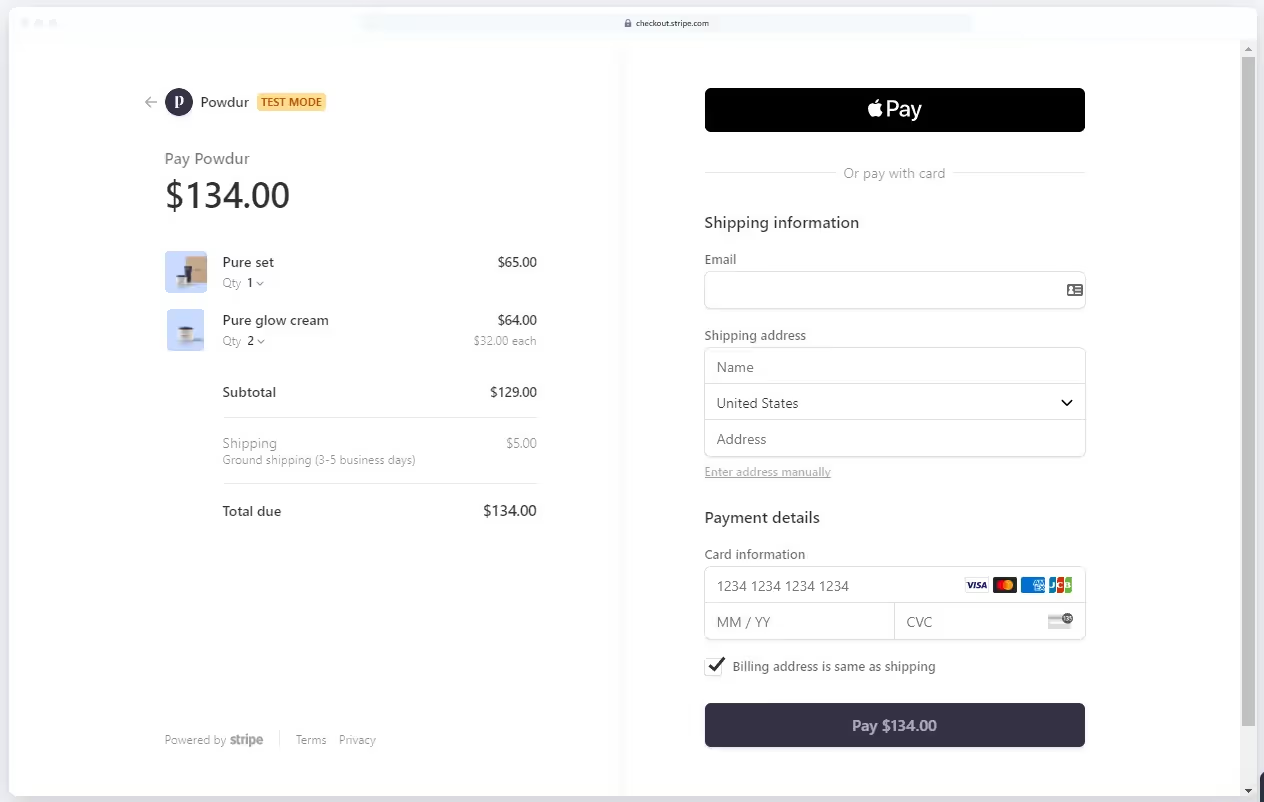An efficient product page is critical in determining whether you make a sale or your competitor gets the customer, regardless of what you're selling. If you are wondering how to create a product page to increase your conversion rate, this article is for you.
Arounda has 5 years of providing innovative design solutions, including UX-UI development for product pages. So, we will explore various aspects of crafting a successful one. We have divided this material into separate blocks: Main Content, User Interaction, and Additional Information. Let's take a closer look at what each item contains.
Main Content
In the question of how to design a product page, we give priority to the content. The main content on the product page directly represents your product. It includes a description, image, transparent pricing, and shipping details.

Description
A well-thought-out product description plays a crucial role in helping customers understand your product's features, benefits, and unique selling points.
These are best practices for creating a compelling and informative product description:
- Before you start writing, take the time to research and understand your audience. Tailor your description to resonate with your TA and address their specific concerns.
- Keep your product description clear and easily read using short sentences and simple language. Break up large blocks of text into smaller paragraphs, or use bullet points to list key features and benefits.
- Use descriptive language to create a vivid and memorable description by engaging your readers' senses.
- Optimize for SEO, incorporate relevant keywords naturally throughout your description, but avoid keyword stuffing.
Images

If you want to know how to create a custom product page, using high-quality product images is crucial. They enhance the visual appeal and aid potential customers in comprehending the product.
The key points to consider when selecting and presenting product images are:
- Use high-resolution images that can enhance the overall appearance of your product page and convey professionalism and reliability.
- Display images that showcase your product from multiple angles and perspectives.
- Present your product images against a clean, consistent background to keep the focus on itself.
- In addition to standalone pictures of the product, provide images showing the product in use or context.
- Optimize your images for loading speed by compressing them without losing quality.
- To improve search engine optimization (SEO) and accessibility, add descriptive alt tags and captions to your product images.
- In addition to static images, consider incorporating videos or 360-degree views of your product.
Transparent pricing
This item may be in the "description" section. However, when you create a product page, the price has a separate and vital place. By implementing transparent pricing on your product page, you can create a more user-friendly and trustworthy shopping experience for your customers.
This is how to do it:
- Ensure that the price of your product is visible and displayed near the product title or image.
- Provide all necessary pricing information, such as taxes, shipping fees, or any other applicable additional costs. Be upfront about these costs to avoid surprising customers during checkout, which can lead to cart abandonment.
- Offer multiple payment options and display the logos of the payment methods to reassure customers that their preferred payment method is available.
- Include a link to your return policy on the product page or provide a summary outlining the conditions and steps for returns or refunds.
- Consider adding a currency converter to your product page if you cater to an international audience.
Shipping details

Another essential block of product information when you create a product page is shipping. Quite often, the comfortable delivery conditions sway a customer to your side.
Pay attention to these tips:
- Include a link to your shipping policy on the product page or provide a summary to ensure customers know the terms and conditions.
- Be upfront about any additional shipping fees, taxes, or handling charges to avoid surprising customers during checkout. If you offer free shipping, highlight this prominently to increase the perceived value of your product.
- Include a link to the tracking information in the email, and consider offering a tracking feature directly on your website.
User Interaction
If you've created a product page correctly, the customer will start purchasing as soon as they receive all the critical information.
Here you can influence the user through call-to-action buttons:
- Craft a CTA that is direct, simple, and easy to understand. Use action-oriented language, such as "Add to Cart," "Buy Now," or "Proceed to Checkout," to communicate the desired action.
- Place the CTA button near the product price and description, making it easily accessible for potential customers.
- Focus on one primary CTA, such as "Add to Cart" or "Buy Now," and use secondary CTAs sparingly. If you include secondary CTAs, ensure they are less visually dominant than your primary CTA.
- Personalize the CTA based on user behavior or preferences. For example, if a customer has previously viewed a particular product, you can display a CTA that says "Buy Again" or "Complete Your Set."
- Make CTAs mobile-friendly. Optimizing your product page and CTAs for a seamless mobile experience is essential as more consumers shop via mobile.
- Keep simple social sharing buttons. Focus on the most relevant platforms, and optimize the sharing experience to maximize the impact.
- Customize the content that customers will share on social media to ensure it is engaging and accurately represents your product. Include an appealing image, an enticing caption, and a link to your product page.
Additional Information
The last block of our tips includes additional information: reviews and suggested products. In general, it doesn't affect the user experience as much as the first two blocks, but it does affect the overall impression of the product.
Customer reviews
Customer reviews are a powerful tool for building trust, credibility, and social proof on your product page. Positive reviews can significantly influence potential customers' purchasing decisions, while constructive feedback can help you improve your products and services.
Tips to effectively showcase it on your product page:
- Encourage customers to leave reviews. Make the review submission process straightforward and user-friendly to increase the likelihood of customers providing feedback.
- Showcase a mix of reviews. Display positive, negative, and neutral reviews to give a balanced and unbiased representation of your product.
- Ensure that your review section is crawlable by search engines and encourage customers to use specific keywords related to your product in their reviews.
Suggested products
Featuring suggested products when you create a product page can help increase average order value, improve customer experience, and encourage customers to explore more of your catalog.
These are the best practices to correctly place the suggested items:
- Leverage customer browsing and purchase history and any available demographic information to generate personalized product recommendations.
- Display items that complement or enhance the leading product on the product page.
- Highlight popular or trending things from your catalog to draw customers' attention to your best-selling or highly-rated products.
- Create bundles or package deals that combine the main product with relevant complementary products at a discounted price.
Ready To Create Great Product Pages?
Creating an effective product page is crucial to a successful online store. Following our tips, you can create a product page and optimize it to engage visitors, convert them into buyers, and, ultimately, grow your online business.
Remember to continuously test and analyze your product page elements to stay ahead of the competition and maintain a robust online presence in the eCommerce landscape.
Contact us if you need professional help with this task. Over the years, we have successfully designed various product pages tailored to our clients' unique needs and goals.














